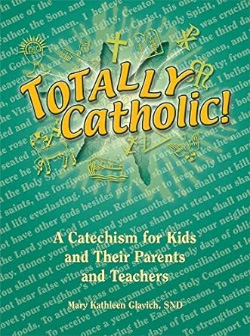Our Father: The Lord’s Prayer
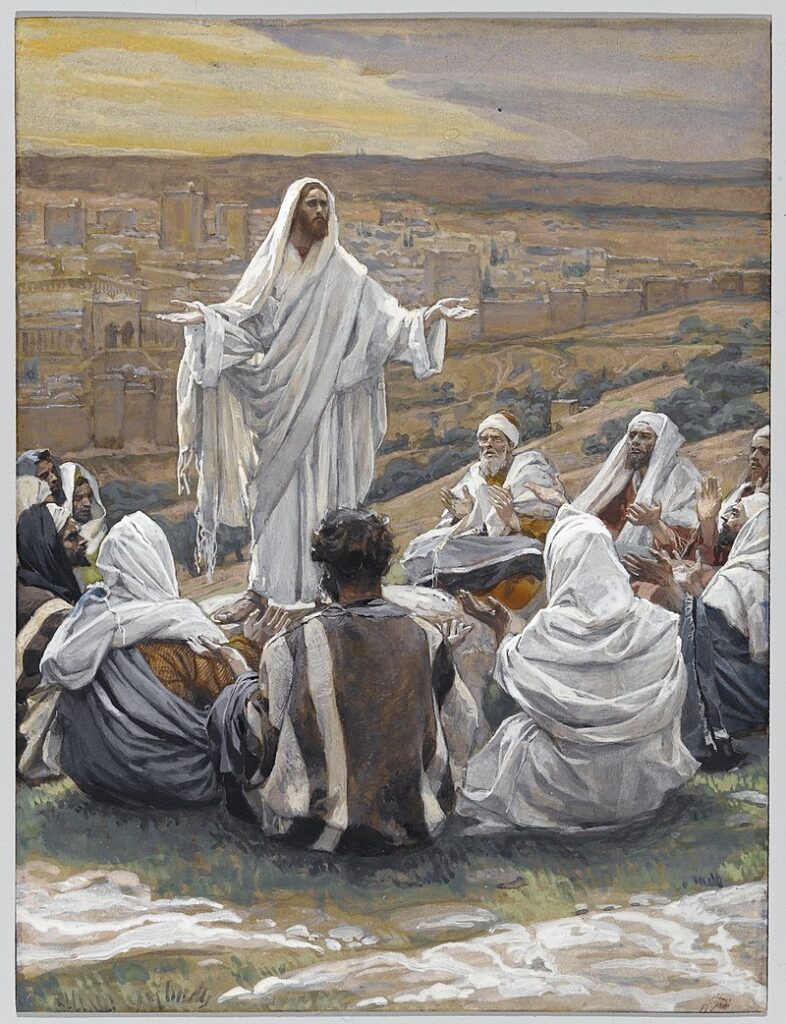
The Preeminent Prayer
The Our Father prayer is central to Christianity. During the Order of Christian Initiation of Adults (OCIA), formerly called RCIA, the candidates receive the Our Father at Mass in the fifth week of Lent. It is a precious gift Christians have prayed for two thousand years. When we pray it, we are united with Christians all over the world.
The Divine Origin

The Church of the Pater Noster (Latin for “Our Father) in Jerusalem traditionally stands on the site where Jesus gave us this prayer. On the church’s outside walls and along a cloister walk are 140 ceramic plaques each with the Our Father in a different language.
The Lord’s Prayer the way we pray it is found in the Gospel of Matthew (Matthew 6:9–13). Jesus says, “Pray this way.” The Gospel of Luke has a shorter version of the prayer (Luke 11:1–4). In Luke, the prayer is Jesus’s response when the disciples asked him to teach them how to pray like John the Baptist taught his disciples. I wonder what form of prayer John taught.
Our Father: The Composition
The prayer comprises seven petitions. The first three focus on glorifying God and the rest are pleas for help. St. Thomas Aquinas wrote that these petitions not only express everything we could ever desire, but they are in the sequence in which they should be desired.
The Catechism of the Catholic Church calls the Our Father the summary of the whole Gospel. (#2161) In the last section of this book the words of the prayer are explained in detail.
Do you remember praying this prayer in Latin? Singing it?
Pater noster, qui es in caelis, sanctificetur nomen tuum
adveniat regnum tuum fiat voluntas tua
sicut in caelo et in terra.
Panem nostrum quotidianum da nobis hodie
et dimitte nobis debita nostra sicut et nos dimittimus debitoribus nostris
et ne nos inducas in tentationem sed libera nos a malo. Amen.
At the end of the prayer, Protestants add: “For thine is the kingdom, the power, and the glory for and ever.” At a Catholic Mass, these words are said after the Our Father is prayed immediately after another short prayer.
Addressing the Father
It makes sense that Jesus’s prayer addresses the Father. He called God his Father 177 times in the Gospels. Since his Father is also our heavenly Father, we direct the Our Father prayer to him.
Saint André Bessette claimed that all earth is a thin space! God is incredibly always close to us no matter where we are. As this saint put it, “When you say the Our Father, God’s ear is next to your lips.” It’s thought-provoking that we don’t address God as almighty One or eternal God, but in the intimate term Father. Also, look at the pronoun: our. We acknowledge that all humankind is united as brothers and sisters.
When the Our Father Is Prayed
The Didache, the first Christian book of instruction from 80–90 A.D., says that the Our Father should be prayed three times a day. It adds to the prayer the words “for yours are the power and the glory forever.” Protestants and Eastern Orthodox conclude with similar doxologies.

You pray the Our Father at Mass when it marks the beginning of the Communion Rite. The rubrics call for the priest or bishop alone to raise his hands during the prayer. People have gotten into the habit of raising their hands too—an early Christian prayer position called orans. Some people hold hands, which is also meaningful. Liturgists frown on these innovations.
You also pray the Our Father six times when you pray the Rosary and once in the Divine Mercy chaplet. You might pray it throughout the day in the Divine Office (Liturgy of the Hours), which is the official prayer of the Church. You might also pray during your personal prayer in the morning and/or evening.
Praying the Our Father Profitably
St. Edmund said, “It is better to say one Our Father fervently and devoutly than a thousand with no devotion and full of distraction.” Since the Our Father is a rote prayer, it is easy to say it on autopilot. To deepen your spirituality, pray it slowly and reflectively. You might ponder each word before moving on. It’s said that a novice asked Saint Teresa of Avila “Mother, what shall I do to become a contemplative?” St. Teresa replied, “Say the Our Father, but take an hour to say it.”
By the way, St. Teresa discusses this prayer at length in her book The Way of Perfection.”

For centuries, as early as Gregorian chant, composers have set the Lord’s Prayer to music. Modern singers have sung the Lord’s Prayer, including Susan Boyle.
• How did you first learn the Our Father?
• Which petition is most meaningful to you?
• How do you fight distractions when you pray?
Here is the Our Father in Aramaic, the language in which Jesus taught it:
Here is a sung version of the Aramaic Our Father:
Divine Mercy and Saint Faustina

Divine Mercy is a comparatively new devotion that Jesus himself introduced to the world through a young Sister of Mercy. The title itself is beautiful. Divine because it centers on the mercy of God. But we use the word “divine” to mean spectacular, as in “that dress is divine.” And the mercy of God truly is wonderful.
When the original sin of Adam and Eve lost eternal happiness for all humankind, God had compassion on us. The devils did not have a second chance to live with him, but we do. God sent his Son to re-establish our relationship with him. Because of the life, death, and resurrection of Jesus, we can hope to live with God forever.
We, though, can waste this opportunity by our personal sins. Again, our loving God extends mercy and forgives us when we are sorry and intend to improve.
The Mercy of Jesus
The gospels reveal that Jesus was always forgiving people: the woman caught in adultery, the cheating tax collector Zacchaeus, the woman whose tears fell on his feet, the paralytic lowered from the ceiling, and his unfaithful apostles who abandoned him when he needed them most.
Jesus also taught that the Father loves to forgive, like the father who welcomed the prodigal son, the shepherd who searches for the lost sheep, and the woman who combs her house for the lost coin.
Divine Mercy Devotion

In 1931 Jesus appeared to Saint Faustina and asked her to promote devotion to divine mercy. He instructed her to have a picture painted that depicted him as he appeared: wearing a white robe and with two beams of light coming from his sacred heart, one red and one white. The colors stand for the blood and water that streamed from his pierced side. The words, “Jesus, I trust in you” were to be written at the bottom of the image.
Jesus also asked that the feast of Divine Mercy be celebrated on the Sunday after Easter. Saint Pope John Paul II instituted this in 2000.
Faustina heard Jesus giving her the words of the Chaplet of Divine Mercy, which can be prayed on rosary beads. Jesus told her he wanted everyone to pray it. The devotion had three purposes: to obtain mercy, to trust in Christ’s mercy, and to show mercy to others.
There is also a Litany of Divine Mercy written by Saint Faustina.
Praying the Chaplet of Divine Mercy
On the Our Father beads, pray “Eternal Father, I offer You the Body and Blood, Soul and Divinity of Your Dearly Beloved Son, Our Lord, Jesus Christ, in atonement for our sins and those of the whole world.”
On the Hail Mary beads this is the prayer: “For the sake of His sorrowful Passion, have mercy on us and on the whole world.”
Complete directions can be found on the Internet or in booklets.
Here is a recording of the chaplet that you can pray along with:
Saint Faustina
The Early Years
Saint Teresa of Avila said, “We always find that those who walked closest to Christ were those who had to bear the greatest trials.” This was certainly true for Saint Faustina.
She was born Helena Kowalska in Poland to a poor, religious family, one of ten children. After three years of school, she wanted to enter the convent, but her parent would not permit it. So she went to work as a housekeeper.
At a dance, She had a vision of the suffering Christ who asked, “How long will you keep putting me off?” He told her to go to Warsaw. So she “eloped.” Without her parents’ permission, she took a train with only the clothes on her back.
Several convents rejected her. Then the Sisters of Our Lady of Mercy agreed she could enter them, but only after she earned money. After a year when she was 20 years old, she joined the convent in 1926 and was given the name Maria Faustina of the Blessed Sacrament. After making vows in 1928, she served in different convents as cook.
The Visions
In 1930, Saint Faustina became ill and sent to rest. Back in the convent, on the night of February 22, 1931, Jesus appeared to her and told her to paint the image of him. None of the other sisters were willing to do this for her. Three years later a man painted it. When Saint Faustina first saw the painting, she cried because it did not capture the beauty of the Jesus she saw. That same night Jesus told her to inaugurate the Feast of Divine Mercy.

The Apostle of Divine Mercy
In 1933, Saint Faustina did gardening at a convent. She confided to a priest that she had visions, but he didn’t believe her. Then Father Michael Sopocko was appointed confessor to the Sisters. After she told him about speaking with Jesus and his plan, he had her undergo a complete psychiatric evaluation, which she passed.
In 1935, Saint Faustina wrote in her diary that the Chaplet of Divine Mercy was dictated to her by Jesus. That same year she wrote rules for a new contemplate religious congregation devoted to the Divine Mercy. A month later she visited a house that she had seen in a vision as her congregations’ first convent. Because she had made vows to one congregation, they couldn’t begin another.
In 1936, Saint Faustina’s tuberculosis worsened, and she was moved to a sanatorium. The next year Jesus instructed her to write a Novena of Divine Mercy. She also wrote the Litany of Divine Mercy. She returned to the convent.
In 1938 her illness progressed and she was sent to another sanatorium. A few months later she was taken back to the convent, where she died at age 33. In Krakow. She is buried in the cities Basilica of Divine Mercy.
Another Setback
Fr. Sopocko told her to keep a diary and record her visions. This diary is published as he book “Diary: Divine Mercy in My Soul.
In 1959, the Vatican forbade Saint Faustina’s Divine Mercy devotion. The was based on a faulty translation of her diary. After two decades the decision was reversed.
Triumph
Fr. Sopocko helped form the Congregation of the Sisters of Mery based on Saint Faustina’s ideas. Popes supported devotion to the Divine Mercy and Sister Faustina was canonized in 2000 after two miracles resulted from her intercession.
Here is a hymn to the Sacred Heart:
• How familiar are you with the Divine Mercy devotion?
Hands of Blessed Mother Mary

Pope Leo XIV
Our God is a God of surprises. He certainly blew us away by giving us an American pope—a Christlike man. Let’s praise and thank God for this gift that renews the hope of the whole world. Did you see the two seagulls walking around the chimney awaiting the white smoke? To me they were a sign of the Holy Spirit overseeing the voting. And then a fluffy grey baby bird joined them, a symbol of new things to come.
Mary’s Youthful Hands
We are in the month of May, the month traditionally devoted to honoring Mary, the Mother of God and our mother. Here is an overview of her life, focused on her hands…
The hands of Mary were not the soft, pampered hands of a queen, but the strong, capable hands of a working woman. As a young girl, surely she helped her mother Anne around the house with daily tasks. What was Mary doing when the Angel Gabriel appeared to her? People conjecture that she was fetching water from the well or spinning wool. Maybe she had her hands folded in prayer.
When Mary went to help pregnant Elizabeth, at their meeting her hands probably embraced her relative and caressed her wrinkled face. Then for three months, Mary’s hands were kept busy serving Elizabeth and mute Zachary with love. Perhaps the two women sewed baby clothes during this time of waiting. I can picture Mary massaging Elizabeth’s back and feet.
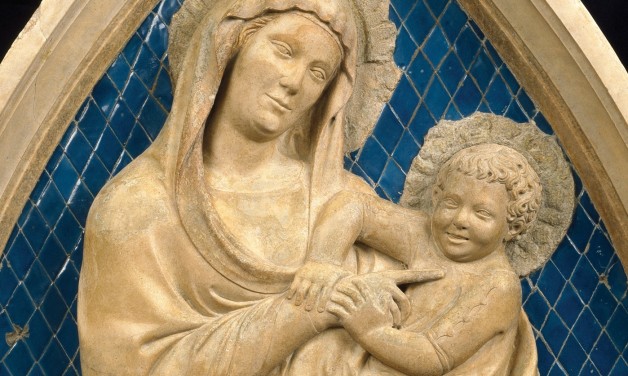
In Bethlehem, Mary’s hands were the first ones to hold God-made-man except for the person (Joseph?) who delivered him. Scripture says that she wrapped her newborn in cloths and laid him in a manger. From that moment—and for the next thirty or so years—her hands were at work caring for her Son. She burped Jesus, tickled him, and held his hands as he took his first steps.
She washed him when he was dirty and sweaty, and when he was hurt in the carpenter shop or playing rough with the other boys, she dried his tears and soothed him.
When Jesus as a preteen was lost for three days, I envision Mary wringing her hands with worry and then on finding him, taking him by the shoulders and giving him a little shake.
In charge of Joseph’s household, Mary kneaded dough, made clothes for her men, swept the floor, and stirred countless stews. No doubt, when Joseph died, it was her hands that lovingly prepared his body for burial.
As an Older Woman
When Jesus returned to Nazareth as a successful teacher and enraged his neighbors by his words in the synagogue, Mary was a witness. As she saw her friends and relatives ready to cast Jesus off a cliff, her hands probably flew to her mouth in horror. (On a precipice in Nazareth is a chapel in ruins called Our Lady of the Fright.)
When Jesus visited Nazareth did he stay at the parental home? Did Mary prepare meals for him and his twelve apostles? Could be.
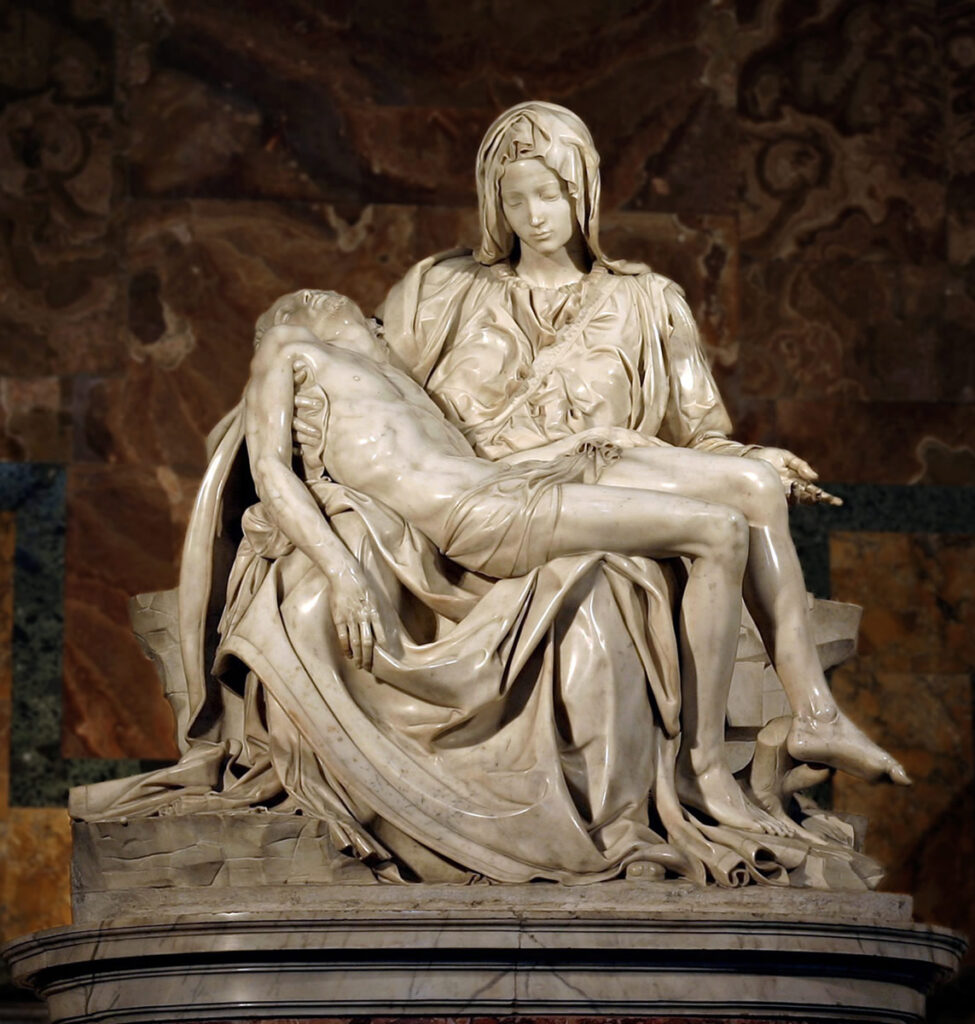
Michelangelo’s poignant “Pieta” reminds us of the dreadful day when Mary held her Son’s body for the last time, now a mutilated, bloody body. It’s been proposed that Jesus’s garment that the soldiers gambled for had been made by his mother.
Before Jesus died, he entrusted himself into the Father’s hands, but he entrusted the apostle John into Mary’s hands. Then Mary had another “son” to care for, actually many sons and daughters.

Safe in Mary’s Hands
Mary also became Mother to all of us. In the Morning Offering we pray, “O Jesus, through the Immaculate Heart of Mary, I offer you….” Mary is not eternally resting in Heaven. No. She is busy working for us as an intercessor. We ask our heavenly mother to “pray for us sinners now and at the hour of our death.”
St. Catherine Labouré had a vision of Mary, which is reproduced on Miraculous Medals. In this vision rays of light streamed from gems on Our Lady’s hands. The Blessed Virgin explained: “The rays are graces which I give to those who ask for them. But there are no rays from some of the stones, for many people do not receive graces because they do not ask for them
.”
The oldest Marian prayer is: We fly to thy patronage, O holy Mother of God; despise not our petitions in our necessities, but deliver us always from all dangers, O glorious and blessed Virgin. Amen.
For your listening pleasure, here is Bing Crosby singing “O Sanctissima” :
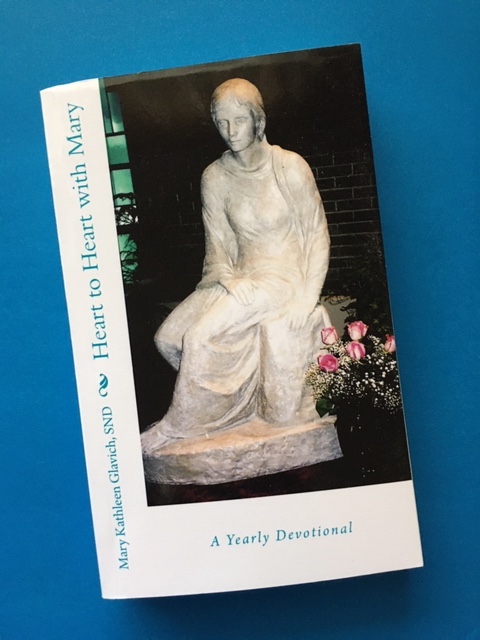
Note
My book Heart to Heart with Mary with daily reflections remains my most popular book. On each page Mary speaks to you personally as her child. It is uncanny how her message for the day is in sync with your life.
The book is $15.00 and available on Amazon.
• What is your favorite prayer to Our Lady? Which of her titles is your favorite?
A Mantra as a Last Resort

My Experiences with a Mantra
I’m Introduced to a Mantra
I spent one Christmas Day in the convent, creating a calendar as a gift for my father. That night my sister called. She said, “Dad had a heart attack. He’s in the hospital. He’s been anointed. You better come.” No one in my family had ever been seriously ill before.
At the hospital, my dad was hooked up to machines and unconscious. I can still hear the hiss of the machine keeping him alive. At home in bed that night I couldn’t sleep. I was petrified wondering what would happen to Dad. What would my mother do? Then gently into my heart came the words, “The Lord is my shepherd.” These words became a mantra. Repeating them over and over comforted me. They made me realize that God was with me and I fell asleep.
The next morning when I returned to the hospital, two men were with my father. One was his doctor who introduced me to the male nurse who had worked overtime caring for my dad Christmas night. His name was Bob Shepherd.
A few years later a retreat director told me he was going to explain a way of praying that he called the prayer of the heart. It was praying mantras. I told him that the Holy Spirit had already taught me to pray that way.
A Mantra to the Rescue Again
In an operating room awaiting surgery for a herniated disk in my neck, I found myself praying, “Even though I walk through the valley of death, you are with me!” After I came to, I kept repeating, “The Lord is my shepherd” all night. In the morning I remarked to a nurse that the machine next to my bed that sounded like a stream flowing over rocks had been very soothing. She said, “There’s no machine next to you.”
When you are sick, tired, plagued with a problem, or stressed out, you may not be able to muster enough energy to pray a Hail Mary or pick up our Bible. At such times you can fall back on the simplest prayer: a mantra. It is a restful and comforting form of prayer. Praying a mantra makes us God-conscious. Of course, God is always present. A mantra gently leads us to become aware of him and his love for us.
Praying a mantra follows St. Paul’s advice to pray without ceasing (1 Thessalonians 5:17). If we make a habit of praying it, soon this prayer is sounding in our hearts without our intending to pray it.
The Jesus Prayer
The shortest mantra is simply “Jesus.” In the Bible we read that the name of Jesus is above every name. At this name every knee should bend (Philippians 2:9–10). Jesus told us that whatever we ask the Father for in his name we will receive.
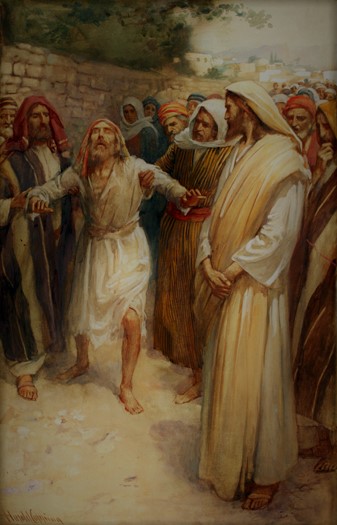
The oldest and most popular mantra is the Jesus Prayer: Lord Jesus Christ, Son of God, have mercy on me, a sinner. Supposedly it originated with the Desert Fathers in the fifth century. The words are Scripture based. They echo the repeated pleas of Bartimaeus: “Jesus, Son of David, have mercy on me” (Mark 10:47) and the prayer of the publican in Jesus’s parable: “Have mercy on me, a sinner” (Luke 18:13). Some people like to pray the first part as they inhale and the second part as they exhale.
In the Jesus Prayer, we call on Jesus by his essential identity, the Son of God, thereby professing faith in his divinity. Then we ask for mercy, as so many hurting people did when Jesus walked the earth. We look to his mercy not only to forgive our sins but to heal us, to open our eyes and ears. At the end we humbly identify ourselves to the all-holy one as not-so-holy sinners.
Someone suggested gradually reducing the prayer as you pray. Begin by repeating the entire prayer. Then repeat it leaving off “a sinner.” Then omit “on me,” and so forth until you are repeating only “Jesus.”
If you are alone, you might make up a melody for the Jesus Prayer and sing it!
How to Pray a Mantra
Once I found myself praying the Jesus Prayer as I crocheted a baby blanket. The words fell in sync with my stitches: “Jesus, Son of God, have mercy on me, a sinner.” You don’t have to crochet to pray a mantra. You can pray it while walking or mopping a floor. Some people like to sit quietly with hands open. Mantras can be sung. Taize prayer are sung mantras.
A priest told me that he spent an eight-day retreat doing nothing but singing, “Jesus, Jesus, let everything that is you flow into me,” to the refrain of Roc O’Connor’s hymn “Jesus Is Lord.” He came out a changed man.
I’ve noticed that sometimes one of the words that I’m saying has become another word, giving new meaning to my prayer.
We can praying mantras while we stand in line in a store, wait for something to download, or sit through a long red light. We can pray mantras when we’re put “on hold” on the phone or when we’re trying to fall asleep.
Sources of Mantras

What can you use for a mantra? You can choose a psalm verse or a line from a prayer, words from the Mass, or make up your own.
My book Prayer-Moments for Every Day of the Year is a collection of possibilities. Originally it was published by Twenty-Third Publications with a different, lovely cover. Then Paulist Press picked it up and allowed me to use my photo of sunrise over the Sea of Galilee on the cover. You can find this book in the bookstore here, buy it from me or from Paulist Press.
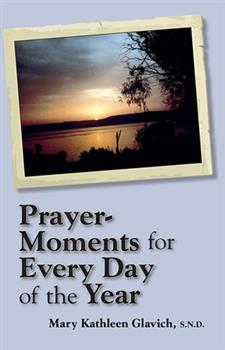
Here is a sample of Taize prayer:
• What has been your experience with mantras? If you’ve never prayed this way, you might try it. You may be surprised.
Jesus’s Wounds Prove Love; So Do Ours

My father was not one to demonstrate affection to us kids either physically or verbally. However, while he was in the hospital dying, one day he held up his hands and said to my mom and me, “I showed my love by these hands.” Dad always worked night shift in a factory and came home at three in the morning. His hands were calloused. Sometimes a fingernail was black, damaged in the shop.
Jesus’s Wounds
I thought of my father’s hands when I read this past Sunday’s Gospel. The risen Lord appears to his apostles and proves that it is really he by showing his hands and feet still marked with the wounds of his love. You would think that a new, glorified body would be perfect—but, no, the body of Jesus bore scars. He may be marked like that for all eternity so that we too will see his scars.

“Christ is risen!”
His body was a mess of wounds from the whippings on his back to the crown of thorns that pierced his head. We focus though on the wounds endured on the wooden cross: the two nails in his hands, the two in his feet, and the one caused by a lance thrust into his side.
Jesus proved that he wasn’t a ghost by inviting the apostles to touch him, by explaining the Scripture passages that referred to his death and resurrection, and by eating. (Ghosts don’t eat.) But the most convincing sign of Jesus’s identity was those five wounds. He used them to convince Thomas that he was risen from the dead, inviting him to touch those wounds. The Gospels don’t say if Thomas did.
The wounds of Jesus were five red badges of his love for us. He will bear those scars for all eternity.
Chaplet of the Five Wounds
A chaplet is a string of beads for praying, for example, the rosary. People pray various chaplets prayed in honor of the five wounds of Jesus. Click here for one along with an explanation of the devotion.
The Stigmata
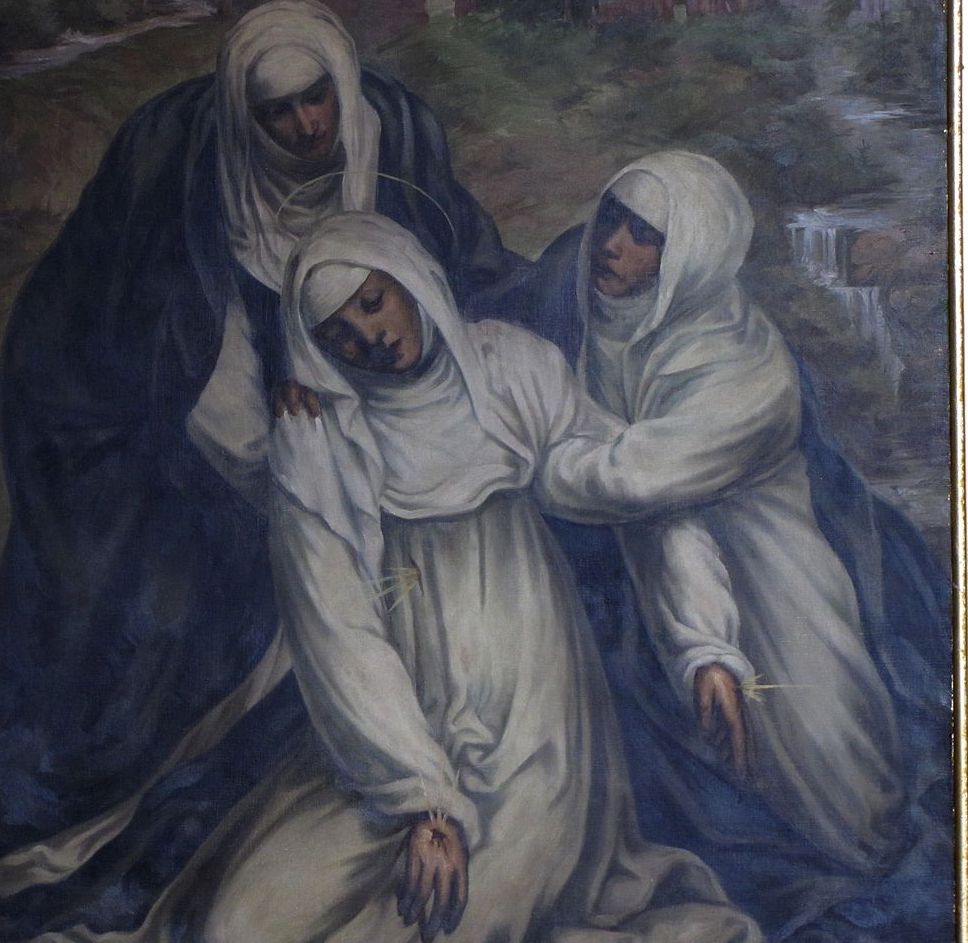
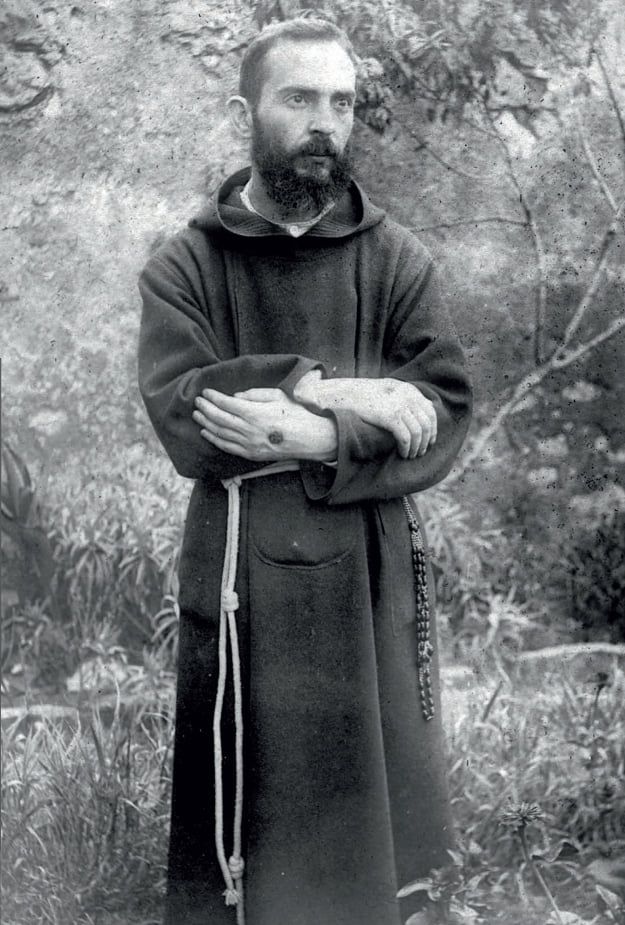
Several saints received the physical phenomenon of the wounds of Jesus appearing in their body. St. Francis of Assisi was the first known stigmatist. St. Catherine of Siena, my patron saint, is another. St. Padre Pio of Pietrelcino is a modern one.
Our Wounds
Loving service takes a toll on us too. Parents bear scars of burns from cooking meals for their families and ironing clothes. Teachers and nurses often develop varicose veins from standing for long hours. Members of the armed forces come home maimed. Police officers get shot or hit or dragged by cars. Some people sacrifice a kidney so that another person can live longer.
Reflecting on Our Wounds of Love
This week we might reflect on people who have been wounded in the course of loving us. We might also ask how we have followed the example of Jesus by offering ourselves for others in some form. What kind of scars do we bear? Blisters from building a Habitat for Humanity house? A knife cut on a finger from preparing a meal for someone at home or in a hunger center?
Keep in mind that some scars are not visible, for example, a bruised heart from being rebuffed after attempting to reconcile with someone.
As we celebrate the fifty days of the Easter season, let’s not forget that the triumph over sin and death was only possible because God endured Good Friday’s pain for love of us.
A Prayer
BEHOLD, O good and sweetest Jesus,
I cast myself upon my knees in Thy sight,
and with the most fervent desire of my soul
I pray and beseech Thee
to impress upon my heart
lively sentiments of faith,
hope and charity,
with true repentance for my sins
and a most firm desire of amendment:
whilst with deep affection and grief of soul
I consider within myself
and mentally contemplate Thy five most precious Wounds,
having before mine eyes that which David, the prophet,
long ago spoke in Thine Own person concerning Thee,
my Jesus: They have pierced My hands and My feet,
they have numbered all My bones [Psalm 21, 17, 18]
Jesus’s Wounds Celebrated in a Hymn
Click on this link to see and hear this hymn:
https://youtu.be/nLo3NJgqaQc?si=XvtbMuFGgYintMyR
• Who has suffered wounds for you?





